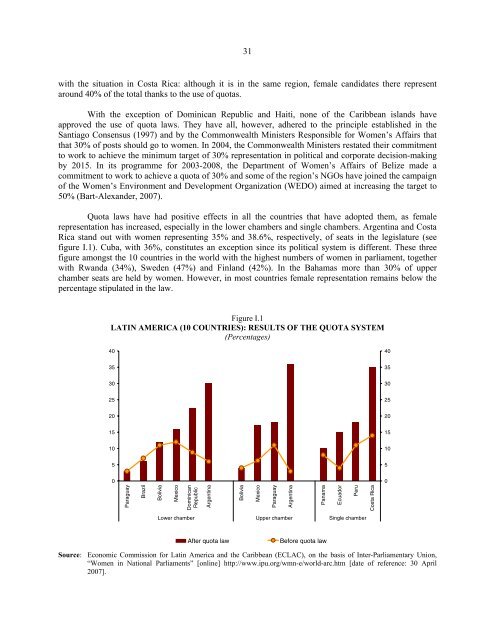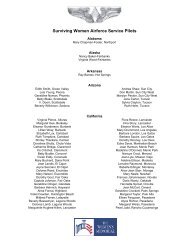Women in Latin America and the Caribbean - Cepal
Women in Latin America and the Caribbean - Cepal
Women in Latin America and the Caribbean - Cepal
Create successful ePaper yourself
Turn your PDF publications into a flip-book with our unique Google optimized e-Paper software.
31<br />
with <strong>the</strong> situation <strong>in</strong> Costa Rica: although it is <strong>in</strong> <strong>the</strong> same region, female c<strong>and</strong>idates <strong>the</strong>re represent<br />
around 40% of <strong>the</strong> total thanks to <strong>the</strong> use of quotas.<br />
With <strong>the</strong> exception of Dom<strong>in</strong>ican Republic <strong>and</strong> Haiti, none of <strong>the</strong> <strong>Caribbean</strong> isl<strong>and</strong>s have<br />
approved <strong>the</strong> use of quota laws. They have all, however, adhered to <strong>the</strong> pr<strong>in</strong>ciple established <strong>in</strong> <strong>the</strong><br />
Santiago Consensus (1997) <strong>and</strong> by <strong>the</strong> Commonwealth M<strong>in</strong>isters Responsible for <strong>Women</strong>’s Affairs that<br />
that 30% of posts should go to women. In 2004, <strong>the</strong> Commonwealth M<strong>in</strong>isters restated <strong>the</strong>ir commitment<br />
to work to achieve <strong>the</strong> m<strong>in</strong>imum target of 30% representation <strong>in</strong> political <strong>and</strong> corporate decision-mak<strong>in</strong>g<br />
by 2015. In its programme for 2003-2008, <strong>the</strong> Department of <strong>Women</strong>’s Affairs of Belize made a<br />
commitment to work to achieve a quota of 30% <strong>and</strong> some of <strong>the</strong> region’s NGOs have jo<strong>in</strong>ed <strong>the</strong> campaign<br />
of <strong>the</strong> <strong>Women</strong>’s Environment <strong>and</strong> Development Organization (WEDO) aimed at <strong>in</strong>creas<strong>in</strong>g <strong>the</strong> target to<br />
50% (Bart-Alex<strong>and</strong>er, 2007).<br />
Quota laws have had positive effects <strong>in</strong> all <strong>the</strong> countries that have adopted <strong>the</strong>m, as female<br />
representation has <strong>in</strong>creased, especially <strong>in</strong> <strong>the</strong> lower chambers <strong>and</strong> s<strong>in</strong>gle chambers. Argent<strong>in</strong>a <strong>and</strong> Costa<br />
Rica st<strong>and</strong> out with women represent<strong>in</strong>g 35% <strong>and</strong> 38.6%, respectively, of seats <strong>in</strong> <strong>the</strong> legislature (see<br />
figure I.1). Cuba, with 36%, constitutes an exception s<strong>in</strong>ce its political system is different. These three<br />
figure amongst <strong>the</strong> 10 countries <strong>in</strong> <strong>the</strong> world with <strong>the</strong> highest numbers of women <strong>in</strong> parliament, toge<strong>the</strong>r<br />
with Rw<strong>and</strong>a (34%), Sweden (47%) <strong>and</strong> F<strong>in</strong>l<strong>and</strong> (42%). In <strong>the</strong> Bahamas more than 30% of upper<br />
chamber seats are held by women. However, <strong>in</strong> most countries female representation rema<strong>in</strong>s below <strong>the</strong><br />
percentage stipulated <strong>in</strong> <strong>the</strong> law.<br />
Figure I.1<br />
LATIN AMERICA (10 COUNTRIES): RESULTS OF THE QUOTA SYSTEM<br />
(Percentages)<br />
40<br />
40<br />
35<br />
35<br />
30<br />
30<br />
25<br />
25<br />
20<br />
20<br />
15<br />
15<br />
10<br />
10<br />
5<br />
5<br />
0<br />
0<br />
Paraguay<br />
Brazil<br />
Bolivia<br />
Mexico<br />
Dom<strong>in</strong>ican<br />
Republic<br />
Argent<strong>in</strong>a<br />
Bolivia<br />
Mexico<br />
Paraguay<br />
Argent<strong>in</strong>a<br />
Panama<br />
Ecuador<br />
Peru<br />
Costa Rica<br />
Lower chamber Upper chamber S<strong>in</strong>gle chamber<br />
After quota law<br />
Before quota law<br />
Source: Economic Commission for Lat<strong>in</strong> <strong>America</strong> <strong>and</strong> <strong>the</strong> <strong>Caribbean</strong> (ECLAC), on <strong>the</strong> basis of Inter-Parliamentary Union,<br />
“<strong>Women</strong> <strong>in</strong> National Parliaments” [onl<strong>in</strong>e] http://www.ipu.org/wmn-e/world-arc.htm [date of reference: 30 April<br />
2007].











